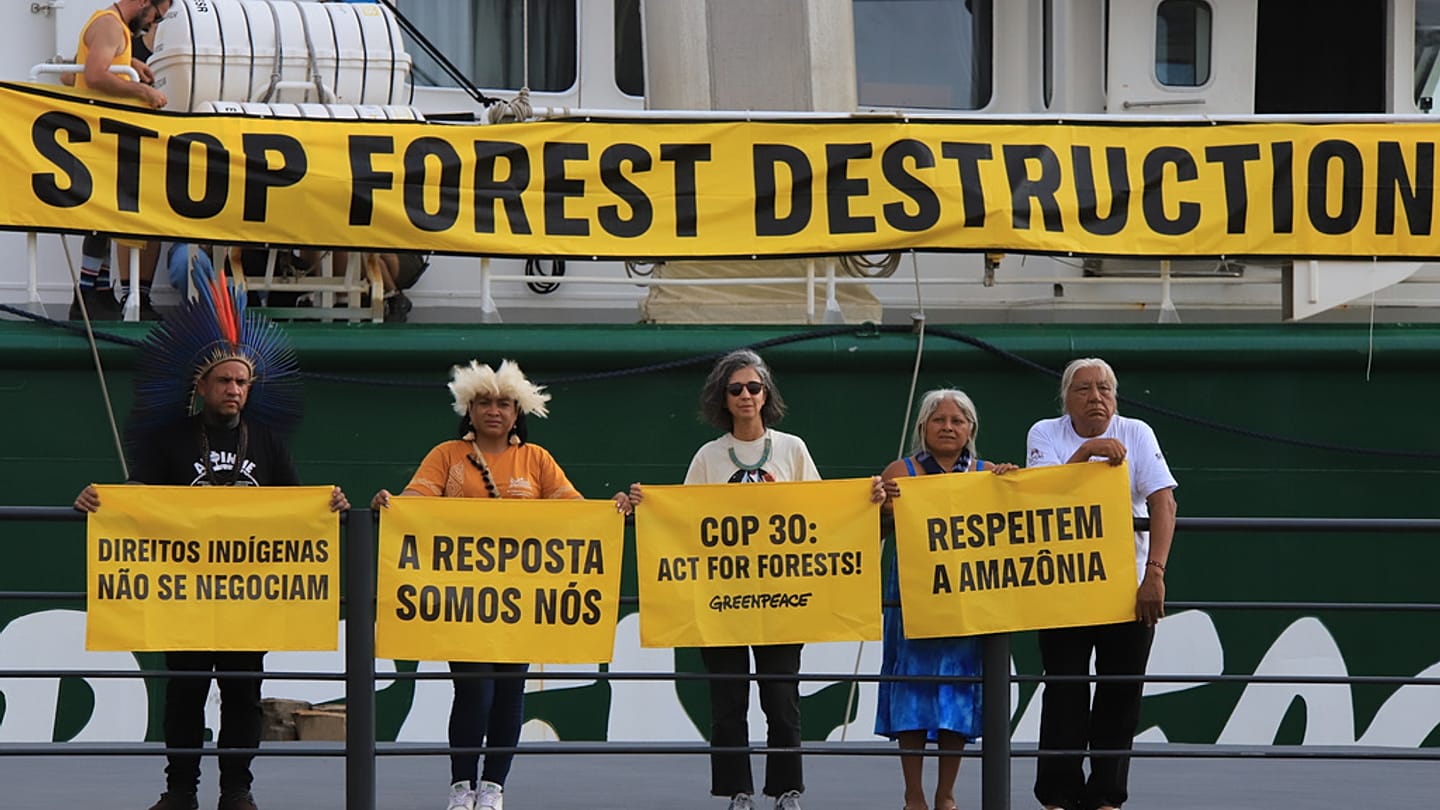Activists call for stronger climate commitments ahead of COP30 summit in Brazil
Activists are calling on world leaders to strengthen goals at this year's convention to reverse the damaging impacts of global warming.
Environmental activists projected messages about climate change onto iconic buildings in Rio de Janeiro as world leaders arrived in Brazil for the UN climate summit, COP30.The installations displayed slogans such as 'Polluters pay', 'Protect forests and people' and 'COP30 Brazil Amazon'.The images also featured political leaders calling for stronger climate action.The move was part of protests by activists from several organisations at the summit venue, demanding stronger action from politicians to fight climate change.On Tuesday, the United Nations Environment Programme released concerning figures from its annual report, which warned that current climate targets will not curb global warming.Fewer promises and more action at COP30For 30 years, world leaders and diplomats have gathered at the United Nations' negotiating sessions to try to curb climate change, but the Earth's temperature continues to rise, and extreme weather worsens.Leaders this year are hoping for fewer pledges and promises - and more action.“At COP30 this week, we will underline our strong commitment to the Paris Agreement. The global clean transition is ongoing and irreversible. It is our priority to ensure that this transition is fair, inclusive and equitable," said European Commission President Ursula von der Leyen."In Belém, we will listen to our global partners and discuss the key issues. To keep our shared goal in sight, we must recognise diverse national realities and work together to deliver," she added.Another key discussion point in this COP30 will be climate finance."The ‘Baku to Belém Roadmap' to be presented by Azerbaijan and Brazil will be a strategic opportunity to scale up finance for developing countries to at least $1.3 trillion (€1.13 trillion) per year by 2035," said the European Commission in a press release.The statement noted that EU countries have contributed €31.7 billion to developing countries in 2024 from public sources, and mobilised around €11 billion more from private funding, figures the bloc aims to expand on.2025 will be the 'implementation COP'Past pledges from nearly 200 nations have fallen far short, and new plans submitted this year barely speed up pollution-fighting efforts, experts say.And if the numbers aren't sobering enough for world leaders when they kick off the action Thursday, there's the setting: Belém, a relatively poor city on the edge of a weakened Amazon.Unlike past climate negotiations - and especially the one 10 years ago that forged the landmark Paris climate agreement - this annual UN conference isn't primarily aimed at producing a grand deal or statement over its two weeks.Organisers and analysts frame this Conference of the Parties as the “implementation COP.”'We want to see action from the largest polluters'In Belém, diplomats, activists, scientists and business leaders will discuss new national climate-fighting plans, the need to save trees that absorb carbon pollution, how communities can adapt to warming, and how to financially help developing nations hit hardest by climate change.The hosts, Brazil, will preside and set the agenda. For the talks to be a success, world leaders need to ramp up efforts and money for adapting to climate change and fund billion-dollar efforts to prevent deforestation and land degradation, said Suely Vaz, who previously led Brazil's environment agency.That high-level meeting is likely to be missing top leaders of the biggest carbon-polluting nations: China, the US and India, who are collectively responsible for around 52 per cent of the world's heat-trapping carbon dioxide from the burning of coal, oil and natural gas.China is sending its deputy premier. The US is mostly skipping this conference under President Donald Trump, a climate change sceptic who has begun the process of withdrawing from the Paris agreement.Palau, one of the countries least contributing to global pollution but most affected by climate change, slammed the lack of representation at the summit, demanding more initiative and accountability from those most responsible.President Surangel Whipps Jr. said it’s important world leaders understand the threat to countries like his: “Without the United States, without China, without India committing, we really have no hope.”“We want to see action [...] particularly from the largest polluters,” Whipps said. “Our communities live on the front lines and we cannot afford more promises.”The climate summit officially begins on 10 November, but leaders' meetings and panel discussions will start on Thursday.


